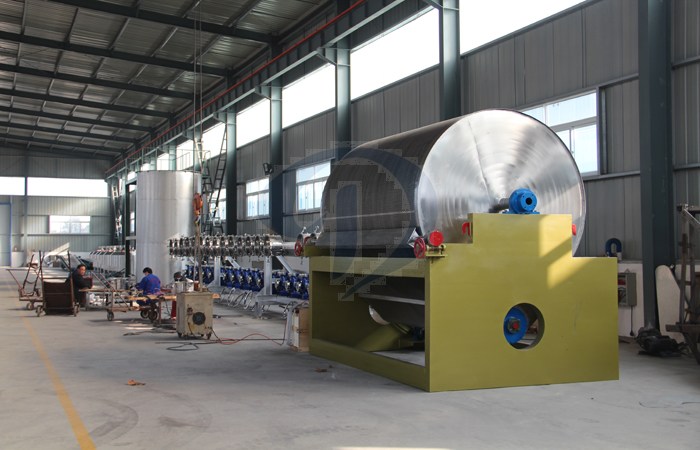What is the method to know quality of cassava starch?
FAQ / Chat online / Technical support / June 18, 2019
There are many factors decide the quality of cassava starch, because of the cassava starch making machine's difference, the quality of cassava starch making machine etc. We can choose what we need exactly acccording to our requirement after reading this article.
1.Meshes
The higher of the mesh, the better of the quality
Method: Fifty grams of cassava starch are screened through the appropriate sieve acnording to grade. While more accurate results can be obtained by making the test with a Ro-tap machine (a mechanical shaker of special design) or other type of mechanical shaker, satisfactory results can be obtained by hand shaking. The meshes are decided by different cassava starch making machine.
2.Feeling
When you touch the cassava starch, it is smoothy, So the more smoothy, the better of quality
3.Viscosity: Must be suitable for both cold flour slurry and cooked starch paste.
By the proper amount of cassava starch is meant the following:
As a standard for comparison, the standard for grade A is always cooked with 10 g of cassava starch per 150 g of distilled water. If the sample which is to be graded is thought to be approximately grade A, then it should be cooked with 11 g of starch per 150 g of water. If the unknown flour is thought to be grade B. then 17 g should be used. If the flour is supposed to be grade C, then 20 g should be used. In this way, if the unknown flour has a higher viscosity than the standard when cooked with 10 g of flour to 150 g of water, then the unknown flour would be grade A, B or C, according to the amount of flour used in the viscosity test.
If a more accurate measure of the viscosity is desired, then additional "cookups" should be made in the same manner as above, with the exception that one should endeavour to find out how much flour is required when cooked with 150 g of water, in order to obtain the same viscosity as the standard grade A flour when cooked with 10 g of flour per 150 g of water.
This amount of cassava starch required by the unknown starch would be the measure for viscosity. For example, if the unknown starch required 13 g per 150 g of water to give the same viscosity as grade A when cooked with 10 g per 150 g of water, then the flour in question would be grade B. having a viscosity of 13.
The proper amount of cassava starch is mixed with 150 g of distilled water in a 250 ml beaker. A rod and a glass thermometer are inserted and the tare is taken. The beaker is placed in a boiling water bath and the contents stirred with the rod and thermometer until the temperature reaches 80ºC. The beaker is covered with a watch glass and is left in the bath for ten minutes without further stirring. At the end of this time the beaker and contents are removed from the bath and the loss in moisture by evaporation is adjusted with hot distilled water. It is then cooled in running water with a minimum of stirring until the starch solution reaches 25ºC. The thermometer is then removed and viscosity comparisons are made by stirring by hand at the rate of approximately two turns per second, with a roughly circular motion. By observing the resistance offered to the rod by the starch solution and comparing that resistance to the standard "cook-up," one can estimate the viscosity of a given sample.

Cassava starch processing plant
contact us
- Do you want to buy machine?
- Yes, I want to buy machine
- No, I want to learn more in advance.
- What is your raw material?
- Cassava
- Potato
- Sweet potato
- Others
- 2. What is the final product you want to produce?
- Garri
- Cassava flour
- Cassava starch
- Cassava chips
- Attiekie
- Bammy
- Others
- 3.What is your capacity plan?
- Small scale garri machine
- 1ton per day
- 2tons per day
- 3tons per day
- 10tons per day
- 20tons per day
- Others
- 3.What is your capacity plan?
- Small scale
- 5tons per day
- 10tons per day
- 20tons per day
- 50tons per day
- 100tons per day
- Others
- 3.What is your capacity plan?
- Small scale
- 5tons per day
- 10tons per day
- 20tons per day
- 50tons per day
- 100tons per day
- 200tons per day
- 300tons per day
- Others
- 3.What is your capacity plan?
- Small scale
- Middle type
- Large scale
- What is your capacity plan?
- Small scale
- 5tons per day
- 10tons per day
- 20tons per day
- 50tons per day
- 100tons per day
- 200tons per day
- 300tons per day
- Others

 Call us
Call us Chat online
Chat online
